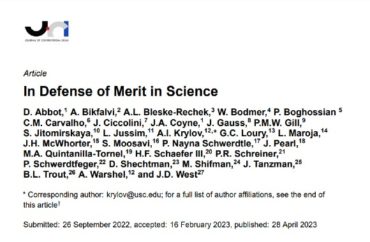
One editor told them their submission was ‘downright hurtful’
More than two dozen scientists struggled to find a journal that would publish their defense of a basic scientific principle: theories should be judged based on whether they are evidence-based, logical, and true.
The researchers finally found a home for their paper — in a publication they “had never heard of” before, called the Journal of Controversial Ideas, according to Jerry Coyne, an ecologist and a professor emeritus at the University of Chicago, and Anna Krylov, a professor of chemistry at USC.
Coyne and Krylov described their efforts, along with their 27 other co-authors, in an article in The Wall Street Journal last week.
They didn’t choose the Journal of Controversial Ideas, Coyne and Krylov wrote. It was simply the only publication that would take it.
One editor told them that their project was “downright hurtful,” the two authors stated in the Wall Street Journal. Another editor wrote that “the concept of merit … has been widely and legitimately attacked as hollow.”
Unfortunately, this stance is not uncommon, Coyne and Krylov wrote.
“We’ve seen this in the trend among scientists to judge scientific research by its adherence to dominant progressive orthodoxies and in the growing reluctance of our institutions to hire and fund scientists based on their ability to propose and conduct exciting projects,” they wrote.
In the paper itself, titled “In Defense of Merit in Science,” 29 authors of both sexes and a range of races, ethnicities and nationalities made the case for scientific rigor.
They explained that they were staking a claim on the “liberal epistemology” side of a current clash of ideas in science and academia broadly.
“Epistemology” refers to the philosophy of knowledge, or how we understand the world. “Liberal” in this sense means not liberal or left-wing politics, but basic freedoms and openness to argument and new ideas, as in the “liberal arts.”
“Liberal epistemology prizes free and open inquiry, values vigorous discourse and debate, and determines the best scientific ideas by separating those that are true from those that are likely not,” the authors wrote. “The statuses, identities, and demographics of scientists are irrelevant to this great sifting of valid versus invalid ideas.”
In other words, the scientists proposed that if a theory or hypothesis is more evidence-based and logical, it should be accepted over one that is less so, regardless of the identity of its author or the purposes it could serve. That used to be a basic principle of academic science that American students learned in grade school.
“In contrast, identity-based ideologies seek to replace these core liberal principles, essential for scientific and technological advances, with principles derived from postmodernism and Critical Social Justice…which assert that modern science is ‘racist,’ ‘patriarchal,’ and ‘colonial,’ and a tool of oppression rather than a tool to promote human flourishing and global common good,” the 29 authors wrote.
Such “identity-based” or social justice ideologies are winning.
Science determined by progressive principles can lead to famine and starvation, Soviet example shows
But Coyne, Krylov, and the 27 other authors didn’t defend merit just out of philosophical principle. They championed it because science that prioritizes merit improves human well-being and helps us understand the world. Science determined by ideology may do the opposite.
Merit-based science has “eradicated smallpox, discovered penicillin, decoded the SARS-CoV-2 virus in a weekend, helped to halve the maternal and child mortality rate globally, revolutionized agriculture, contributed to extending life expectancy in every country, and has generally granted humanity the gifts of life, health, wealth, knowledge, and freedom,” according to the paper.
The progressive claim that scientific truths are “malleable and subjective”; the denial of basic facts of biology, like the binary nature of sex, for political ideology; the promotion of Indigenous “ways of knowing” as a replacement for the scientific method — all these woke ideas run counter to basic scientific principles, and may have disastrous consequences.
 We’ve seen this play out before, Krylov and Coyne warned.
We’ve seen this play out before, Krylov and Coyne warned.
The former Soviet Union promoted bad science dictated by progressive principles. Its government championed the theories of Trofim Lysenko, a hack crop scientist who rejected basic genetics because Marxist ideology dictated that traits are socially produced, not inherited from parents.
Lysenko (pictured) “claimed that wheat plants raised in the appropriate environment produce seeds of rye, which is equivalent to saying that dogs living in the wild give birth to foxes,” according to Britannica.
When other Soviet scientists criticized Lysenko’s claims on the basis of lack of evidence, some got fired or sent to prison camps, Coyne and Krylov wrote in the Wall Street Journal.
Not only that, but the implementation of Lysenko’s bad — but politically correct — theories “led to famines and the starvation of millions,” the scientists stated.
“Yet a wholesale and unhealthy incursion of ideology into science is occurring again — this time in the West,” they wrote.
It’s unfortunate that it took a journal of controversial ideas to sound the alarm.
Editor’s note: A previous version of this article claimed the paper “In Defense of Merit in Science” has 27 co-authors. The correct total is 29.
IMAGES: Journal of Controversial Ideas screenshot, Britannica
Like The College Fix on Facebook / Follow us on Twitter






Please join the conversation about our stories on Facebook, Twitter, Instagram, Reddit, MeWe, Rumble, Gab, Minds and Gettr.